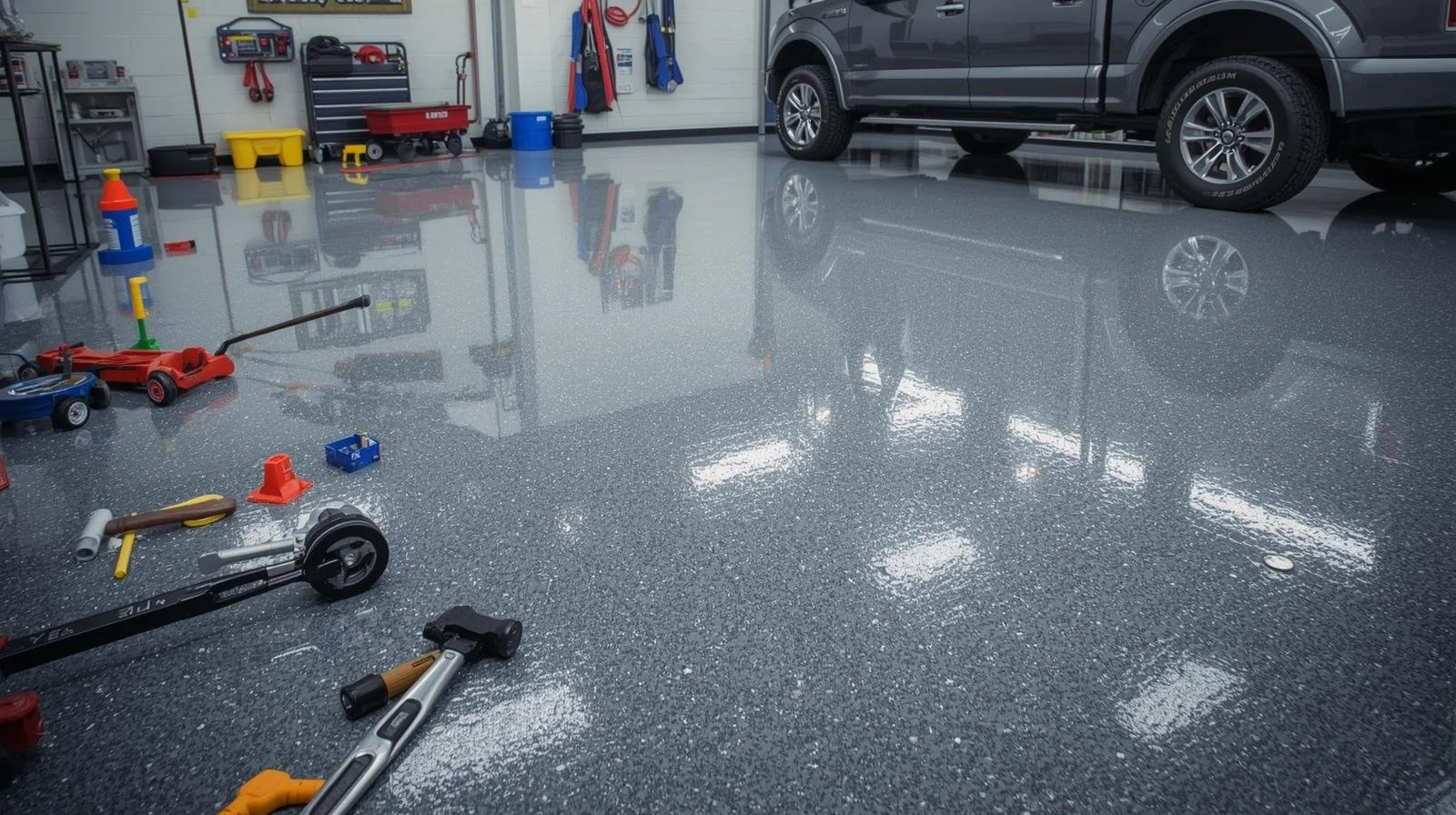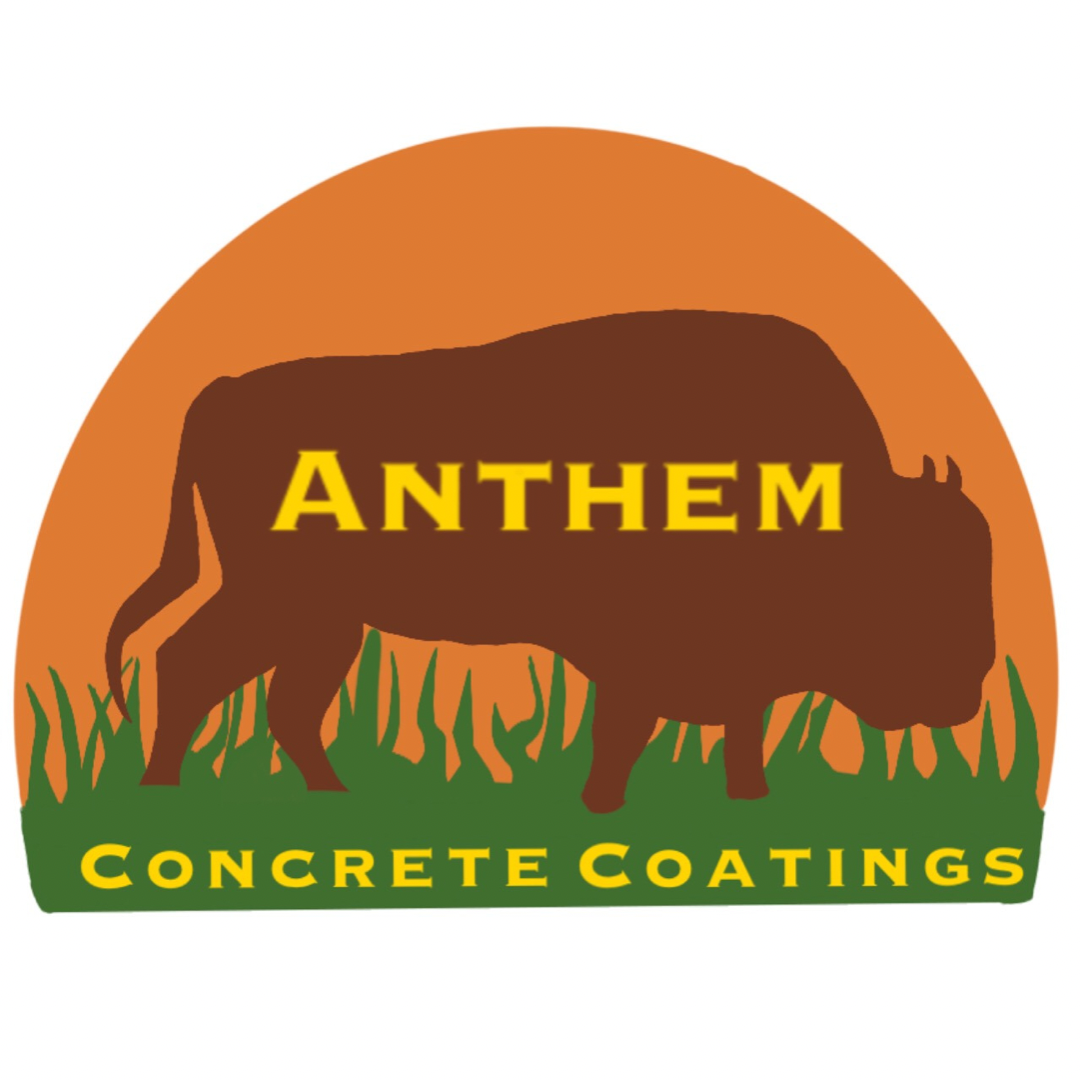
Garage Floor Coatings That Withstand Heavy Use from Tools, Toys, and Trucks
Published by Anthem Concrete Coatings - Your trusted concrete coating specialists serving Kansas City, GA and surrounding areas
When your garage doubles as a workshop, storage area, and parking space, ordinary concrete floors simply won't cut it. Between heavy tool drops, toy wheels, truck tires, and constant foot traffic, your garage floor endures punishment that would destroy most surface treatments. The right garage floor coatings can transform your vulnerable concrete into a fortress that handles everything you throw at it.
What Makes Garage Floor Coatings Essential for Heavy-Duty Use?
Unprotected concrete is porous, prone to cracking, and absorbs oils, chemicals, and moisture that cause permanent staining and deterioration. The epoxy product segment led the market and accounted for more than 40.4% share of the global revenue in 2022, exhibiting properties such as excellent adhesion, heat and chemical resistance, and favorable electrical insulation.
Professional-grade garage floor coatings create a protective barrier that:
Prevents concrete degradation from oil drips, hydraulic fluids, and battery acid
Resists impact damage from dropped tools and heavy equipment
Eliminates dust that concrete naturally produces over time
Provides easy cleanup of spills and debris
Increases light reflection for better visibility during detailed work
The North America concrete floor coatings market size was exhibited at USD 435.15 million in 2023 and is projected to hit around USD 702.09 million by 2033, growing at a CAGR of 4.9%, indicating strong demand for durable flooring solutions.
Types of Heavy-Duty Garage Floor Coatings
Epoxy Garage Floor Coatings
Epoxy garage floor systems remain the gold standard for durability and chemical resistance. These two-part systems create a thick, glass-like surface that bonds permanently with properly prepared concrete.
Advantages:
Exceptional chemical resistance to oils, gasoline, and automotive fluids
High build thickness (up to 1/8 inch) for maximum protection
Available in solid colors, metallic finishes, and decorative flake systems
Cost-effective for large areas
Proven track record spanning decades
Considerations:
Requires 2-7 days for complete curing
Can yellow under UV exposure without proper topcoats
May chip under extreme impact if improperly installed
Polyaspartic Coatings
The newest advancement in concrete coatings technology, polyaspartic systems offer superior performance characteristics. Polyaspartic coatings require expert prep and pro equipment, but the whole process is done in just one day, with lifespans of 10–20+ years.
Advantages:
Lightning-fast cure times (4-6 hours)
Exceptional UV stability prevents yellowing
Superior flexibility reduces cracking
Outstanding chemical resistance
Temperature tolerance from -40°F to 200°F
Considerations:
Higher initial investment
Professional installation required
Weakness to battery acid compared to epoxy
Polyurea Systems
Compared to traditional epoxy, Pure Polyurea boasts being four times stronger and ten times more flexible, making it resilient to chipping, cracking, or peeling under strenuous conditions.
Advantages:
Extreme flexibility prevents cracking
Rapid cure times
Excellent for temperature fluctuations
Superior impact resistance
Considerations:
Most Polyurea garage floor coatings are not as durable, chemical resistant or UV resistant as Polyaspartic coatings
Limited availability from qualified installers
Comparison of Heavy-Duty Garage Floor Coating Systems
Coating Type
Cure Time
Lifespan
Chemical Resistance
Impact Resistance
UV Stability
Cost Range
Standard Epoxy
3-7 days
10-15 years
Excellent
Good
Fair (with topcoat)
$
High-Build Epoxy
3-7 days
15-20 years
Excellent
Very Good
Fair (with topcoat)
$$
Polyaspartic
4-8 hours
15-25 years
Excellent
Excellent
Excellent
$$$
Polyurea
2-4 hours
12-18 years
Good
Excellent
Good
$$
Hybrid Systems
1-2 days
20+ years
Excellent
Excellent
Excellent
$$$$
Key Performance Factors for Heavy-Use Applications
Mil Thickness and Build Rate
High-quality epoxies and most polyaspartics used by pros have 85-100% volume solids, which helps create an extremely durable protective surface. Thicker coatings provide better protection:
Light duty: 5-8 mils
Standard residential: 10-15 mils
Heavy-duty garage: 20-40 mils
Industrial applications: 40+ mils
Chemical Resistance Ratings
Professional-grade garage floor epoxy systems must resist common garage chemicals:
Motor oils and lubricants: Excellent resistance required
Gasoline and diesel fuel: Critical for automotive use
Hydraulic fluids: Important for equipment maintenance
Brake fluid: Essential for DIY mechanics
De-icing salts: Crucial in colder climates
Battery acid: Variable by coating type
Compressive and Tensile Strength
Heavy equipment, floor jacks, and vehicle loads demand coatings with superior mechanical properties:
Compressive strength: 8,000+ PSI typical for quality systems
Tensile strength: 3,000+ PSI for crack resistance
Flexural strength: 4,000+ PSI for impact tolerance
Bond strength: 400+ PSI to concrete substrate
Installation Considerations for Maximum Durability
Surface Preparation Standards
The foundation of any long-lasting coating system is proper concrete preparation. Anthem Concrete Coatings follows industry-leading standards:
Concrete Assessment
Moisture content testing (< 4% required)
Surface profile evaluation (CSP 2-3 minimum)
Contamination removal protocols
Structural crack evaluation
Mechanical Preparation
Diamond grinding for optimal surface profile
Shot blasting for consistent texture
Crack repair with structural adhesives
Joint sealing and expansion management
Environmental Controls
Temperature monitoring (50-85°F ideal)
Humidity management (< 85% RH)
Dust containment systems
Proper ventilation requirements
System Design for Heavy Use
Professional installations incorporate multiple protective layers:
Base Coat Application:
Penetrating primer for concrete sealing
100% solids epoxy or polyaspartic base
Aggregate broadcast for texture (optional)
Build Coats:
Additional epoxy layers for thickness
Color and decorative elements
Slip-resistant additives as needed
Protective Topcoat:
UV-stable clear coating
Enhanced chemical resistance
Easy-clean surface properties
Maintenance and Longevity
Daily Care Practices
Proper maintenance extends coating life significantly:
Immediate spill cleanup prevents staining
Regular sweeping removes abrasive debris
Monthly washing with pH-neutral cleaners
Quarterly inspection for damage assessment
Annual professional evaluation for optimal performance
Expected Service Life
With proper installation and maintenance:
Standard epoxy systems: 10-15 years
High-performance polyaspartic: 15-25 years
Hybrid systems: 20+ years
Industrial-grade applications: 25+ years
Cost Analysis: Investment vs. Long-Term Value
Initial Investment Factors
Professional concrete coatings pricing varies based on:
Coating type and quality grade
Surface preparation requirements
Square footage and accessibility
Decorative elements and customization
Local market conditions
Long-Term Value Proposition
Quality garage floor coatings provide substantial returns:
Eliminated floor replacement costs (concrete restoration can exceed $8-12 per square foot)
Reduced maintenance expenses compared to bare concrete
Enhanced property values with professional-grade finishes
Improved functionality for hobby and professional use
Energy savings through increased light reflection
Choosing the Right Coating for Your Needs
Light-Duty Residential Use
Best choice: Standard epoxy with decorative flakes
Key benefits: Cost-effective, attractive, good protection
Ideal for: Parking, light storage, occasional projects
Heavy-Duty Workshop Applications
Best choice: High-build epoxy or polyaspartic systems
Key benefits: Maximum chemical resistance, superior durability
Ideal for: Automotive work, woodworking, metal fabrication
Extreme-Use Commercial Applications
Best choice: Polyaspartic or hybrid systems
Key benefits: Fastest return to service, longest lifespan
Ideal for: Commercial garages, fleet maintenance, heavy equipment
Why Professional Installation Matters
Technical Expertise Requirements
Modern garage floor coatings demand specialized knowledge:
Material chemistry understanding for proper mixing and application
Environmental condition management for optimal curing
Surface preparation techniques using professional equipment
Quality control procedures ensuring system integrity
Safety protocols for chemical handling and ventilation
Equipment and Tools
Professional contractors utilize specialized equipment unavailable to DIY installers:
Industrial diamond grinders for surface preparation
Shot blasting equipment for consistent profiles
Moisture meters and surface profilers for quality control
Spray application systems for uniform coverage
Environmental monitoring tools for optimal conditions
Anthem Concrete Coatings: Your Kansas City Concrete Coating Specialists
With years of experience serving Kansas City, GA and surrounding communities, Anthem Concrete Coatings combines technical expertise with local market knowledge. Our team understands the unique challenges of Missouri's climate, from humidity management to seasonal temperature variations.
Our Service Commitment
Free detailed assessments with written proposals
Manufacturer-backed warranties on materials and labor
Flexible scheduling to minimize disruption
Post-installation support and maintenance guidance
Local availability for service and questions
Coverage Area
Anthem Concrete Coatings proudly serves:
Kansas City and Lowndes County
Thomasville and Thomas County
Tifton and Tift County
Moultrie and Colquitt County
Surrounding Missouri communities
Frequently Asked Questions
Q: How long do garage floor coatings last with heavy use? A: Professional-grade systems typically last 15-25 years with proper maintenance, even under heavy use conditions.
Q: Can coatings handle hot tire pickup from motorcycles and sports cars? A: Yes, quality polyaspartic and high-grade epoxy systems resist hot tire marking when properly installed.
Q: What's the difference between DIY kits and professional installation? A: Professional systems use commercial-grade materials, proper surface preparation, and controlled application conditions that DIY kits cannot match.
Q: How soon can I park vehicles after installation? A: This varies by coating type: epoxy systems require 3-7 days, while polyaspartic coatings often allow vehicle traffic within 24 hours.
Q: Do coatings work on cracked concrete? A: Yes, professional installation includes crack repair and stabilization as part of the surface preparation process.
Conclusion: Investing in Long-Term Protection
Your garage floor endures constant punishment from tools, toys, and trucks. The right garage floor coatings transform vulnerable concrete into a protective surface that enhances both function and appearance. Whether you choose traditional epoxy garage floor systems or advanced polyaspartic technologies, professional installation ensures optimal performance and longevity.
The concrete floor coatings market is projected to grow at 6% CAGR from 2021 to 2027, reflecting increasing recognition of these systems' value. Don't let another day of wear and tear damage your concrete investment.
Contact Anthem Concrete Coatings today for a comprehensive assessment of your garage flooring needs. Our Kansas City-based team combines technical expertise with local market knowledge to deliver coating solutions that withstand everything Kansas City can dish out.
Anthem Concrete Coatings - Transforming concrete surfaces throughout Kansas City, GA and surrounding areas. Licensed, insured, and committed to excellence in every project.
